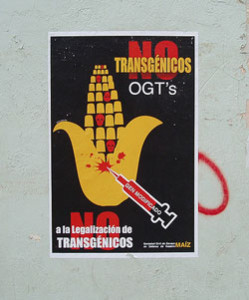 |
| GMO maiz by nolosabias on Flickr (cc-by-nc-nd) |
The document, A new approach to governing GM crops? Global lessons from the rising powers, was launched during an interesting discussion workshop at the Royal Society’s premises in London on Friday 13 June.
If you’ve kept half an eye on public debates and media reporting about transgenic crop issues over the last decade, you may well have received the impression that farmers and publics in several ‘developing’ countries have embraced GM crops and foods. After all, transgenic crops such as soybeans, cotton and maize are being grown by numerous farmers, including small-scale cultivators, in populous low- and middle-income nations such as China, India, Brazil, South Africa, Pakistan, and a handful of others.
More than a few commentators have suggested that these countries’ openness to transgenic crop technologies puts the ‘selfish’ and ‘irrational’ anxieties of affluent European consumers into a shameful perspective. Unlike the well-fed Europeans, goes this argument, impoverished cultivators and hungry consumers in the global South cannot afford to turn up their noses at this vital, safe and productive technology.
Testing the narrative
The Durham University research used an innovative combination of social science research methods to put this narrative to the test. The project was carried out in collaboration with a team of academics from the countries concerned, and funded by the John Templeton Foundation, a philanthropic donor that likes to invest in the study of big social, philosophical and scientific questions.
The researchers spent time observing, interviewing and discussing GM crop issues with national scientists, groups of small-scale farmers and urban consumers in each of the three countries, culminating in deliberative workshops that brought these diverse groups and other stakeholders together.
The researchers found that the spread of GM crop cultivation did not necessarily mean that farmers and consumers were all completely comfortable or satisfied with the technology. In fact, transgenic crop technologies have proved quite controversial, and unpopular with some stakeholders in all three of the focus countries.
Both growers and consumers said that they felt ill-informed about the technology, its environmental and socio-economic implications, and its prevalence in agriculture and the food system. They felt excluded from decision-making and suspected the motives of agribusiness companies, entrepreneurs, large-scale farmers, politicians, and regulators.
Differences
Scientific experts were more likely to dismiss public concerns and argued that the development and deployment of transgenic technologies was rightfully an urgent priority for the sake of national prestige, scientific competitiveness, economic development, and food security.
Yet in some cases, younger scientists were more likely to have reservations about the necessity and benefits of genetic modification. They worried about ecological effects and sustainability, and did not necessarily share the confidence of previous generations in the inevitability of achieving social and economic progress through modern technology.
The researchers also identified interesting differences between Brazil, Mexico and India. For instance, it is quite widely known that maize (corn) occupies a central place in the cultural traditions and identity of Mexicans, but soybeans in Brazil are an introduced crop without traditional culinary associations, which is produced largely for animal feed or for export.
Cotton in India is an intermediate case – a non-food crop whose history is, nevertheless, intimately linked with that country’s experience of colonial exploitation. Differences like these help to explain why national controversies over genetic modification have followed different paths.
A breakdown in trust
For me, one of the report’s most troubling observations was of a pervasive breakdown in public trust in institutions of science, governance and regulation. This is especially troubling with regard to small-scale farmers’ lack of confidence in the scientists and technical advisors of the agricultural extension services, agro-dealers and seed companies, who should be helping them to solve their farming problems.
When agricultural technicians and farmers freely blame one another for problems that are beginning to appear in transgenic cropping systems (such as pest resistance and herbicide-tolerant weeds), and neither accepts responsibility for their part, we have evidence of a serious breakdown in a key relationship that should be helping to improve the productivity and sustainability of agriculture around the world.
New forms of governance
The Durham-led research team intends to build on the insights from this research in various ways. One of these ways is towards the practical goal of building better institutions for the governance of controversial technologies, using the ‘AIRR framework’.
AIRR stands for four dimensions of ‘responsible innovation’: anticipation of future developments in science and technology; inclusion of diverse stakeholders; reflexivity among scientists and technology developers; and responsiveness to societal needs and problems.
This framework has a lot in common with elements of the STEPS Centre pathways approach, which calls for the opening up and broadening out of public debates and governance frameworks for new technologies.
If the Durham report achieves the impact it deserves, it will achieve a valuable purpose by internationalising narrow British and European public debates about transgenic crops and foods, and about the relationship between agricultural technoscience and socio-economic development. It will undermine the complacent assumption that the ‘rising powers’ have definitively resolved the controversy over transgenic crops and that the future will see them inevitably race ahead in embracing GM technology.
Links
- A new approach to governing GM crops? Global lessons from the rising powers (GMFuturos website)
- STEPS Centre Hot topic: GM Crops – risk, science, public trust
- Made by Monsanto: the corporate shaping of GM crops as a technology for the poor – STEPS Working Paper 11
